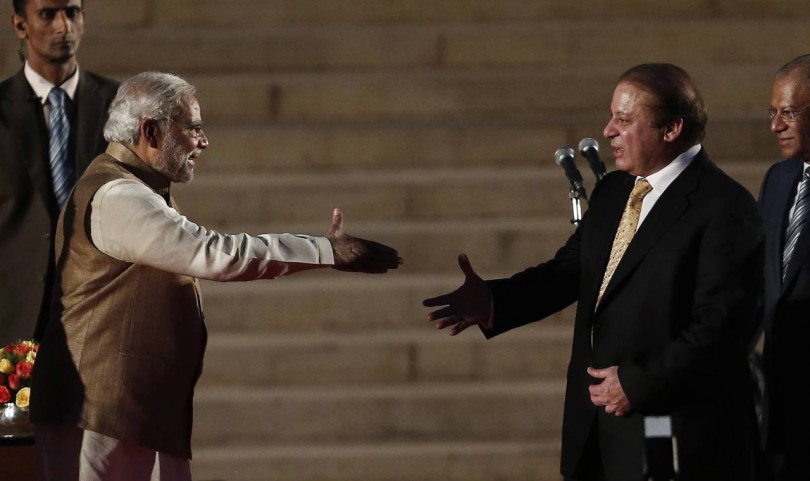Recorded in history, is the tale of two states where the ghost of the most gruesome events still haunts the fragile attempts to mend ties. The intricate courtship between the two countries has been fashioned by three full scale wars and later intense clashes, leaving both with damaged trust issues.
With each day, more vindictive proceedings unfold, with no exception to the last few days. The open violation over LOC from across the border has not spared the loss of life and no heed has been paid to the plea of the UN observer group. Diplomatic protests failed to hinder the Indian aggression over LOC which left little room for Pakistan to play the mister nice role. Within this thin air of peace, talks between Pakistan and India went foggy and resulted in high level state official media briefings, ultimately getting cancelled due to preconditions set by the other side.
Diplomacy lies at the heart of smooth state affairs but given the case of Pakistan – India ties, this concept is put to test. This diplomatic carpet has seen three major pacts, the Simla Agreement, Agra Summit and the Lahore Summit; where the two states made somber efforts to negotiate. Cross border trade and commuting services aided in bridging governmental gaps, but deep wounds did not heal. Counter insurgency remains an active tactic of the Indian military and the government turns the wheels of its policy towards Pakistan in its accord. This is where the doors of diplomacy get tighter and with both nations struggling to get through, desired results are not achieved. This state of puzzlement was clearly visible in the media briefing of the Indian foreign minister, personifying the dialogues with that of a sedan. Agreeing to the point that the road of negotiations is rather a rough one, such attempts to solve matters should not be halted. India for now in the eyes of the world has lost the first round of talks by neglecting Kashmir. The arrest of the Hurriyat leaders by the Indian authorities was a plain sign of aggression as it acknowledged Kashmir as a third force. What needs to be understood by India is that Kashmir is the direct stakeholder in the process hence denying the fact that of a third part intervention is not a sound rational.
Diplomacy lies at the heart of smooth state affairs but given the case of Pakistan – India ties, this concept is put to test. This diplomatic carpet has seen three major pacts, the Simla Agreement, Agra Summit and the Lahore Summit; where the two states made somber efforts to negotiate.
The Stakes:
Two neighboring nuclear states represent unstable periodic elements, as much as it acts as deterrence; it is fully capable of acting like a ticking time bomb. The Indian hostility in Kashmir is not an unseen picture but the stakes weigh differently. The claim and control of India in Kashmir if explained by definition is a form of state terrorism. The flexibility in this case will give a dubious signal, highlighting the complexity of the matter. Indian attempts to rattle Pakistan into the warmongering mood have been botched by the chilling yet stern response by Pakistan. The wining ball still lies in the court of Pakistan, since the witty mind set of Modi is to keep Pakistan engaged at all fronts, the “ if you want war “ message sent by the establishment has poked the delusional bubble which India made efforts to create. India’s ability to act as the victim and complain to the greater “master” the U.S, has often made Pakistan take the undeserving bashing, which has had the repercussions of its own. Weighing the pros and cons of even a standoff between the two would only highlight the pressed issue of Kashmir, compelling the international community to give more than just lessons of dialogue and restraint. Agencies such as Amnesty will open the Pandora’s Box, bursting of human rights violations. The vultures of war-loving scenario eyeing the flesh of the neighbor cannot be caged behind bars of negotiations. Pakistan on the other hand, needs to manage the exchange of pleasantry presents and fill the vacancy of a foreign minister with a qualified individual; who performs the contractual obligation of keeping track of shifting regional plates. In case, the sirens are turned, India and Pakistan both will encounter an unimaginable aftermath, varying from loss of life to damaged infrastructure in proximate urban settlements which will again turn the compass to dialogues where chances of bending towards undesirable agreements such as Kashmir might see a break through.
Two neighboring nuclear states represent unstable periodic elements, as much as it acts as deterrence; it is fully capable of acting like a ticking time bomb. The Indian hostility in Kashmir is not an unseen picture but the stakes weigh differently. The claim and control of India in Kashmir if explained by definition is a form of state terrorism.
The uneven regional lobbying:
The glitches in ensuring sustainable ties within the region have been a drawback in the recent Pakistani dealings, pushing back the brotherly ties with the Muslim Gulf states to decades. Pakistan needed to play cleverly over the requested military assistance by the Kingdom of Saudi Arabia. In return to which, Pakistan could have won the lottery ticket to unlimited preferences; from oil to demand in more rights for its citizens settled in the Holy Land. Pakistan’s missed golden egg has well been taken and treated with absolute care by the Indians. The red carpet treatment given to the Indian air force in an important airbase located in the mountains of Taif was the first of its kind. This shaking of hands between the orients and the kings-men should be enough for Pakistan to understand that the rejection to the proposal has not been taken satisfactorily. More aggressive remarks came from the state that funded ethnic killing in Pakistan, after Modi’s warm embrace with the Sheikh of U.A.E. The lobbying ways have evolved over time, consuming the essence of the misused concept of Ummah, but Pakistan will have to devise a plan to enlighten and entertain the rulers of the Arab. India leapt on the missed opportunity and improved its ties that can serve the long term benefits of the country in all aspects. Having China as a friend should not block Pakistan’s vision of registering itself in the good books of other countries and to do so one must have a foreign minister whose sole duty should lie in the management of international affairs. The sheer absence of such a minister weakens the democratic set up, giving the impression of not taking such a position seriously. Pakistani PM’s decision to snub Kashmir in Moscow gave India something to beat about when the talks were around the corner. Also, the visit played no significant role in cozying up the Russian counterpart which, if well thought could have opened new doors for Pakistan, somewhat countering the appalling loss made in the gulf. Apart from the boastful Pak-China corridor and the enviousness of other countries, Pakistan needs to look at other horizons befitting the needs of development and handy backstreet diplomatic friends.
The upcoming OIC summit is perhaps Pakistan’s final attempt to bandage the wounds made to the Gulf States in particular. The administration can skillfully create the environment for sound dialogue and deals. Explanation for excusing the Kingdom can be well sought and cooling the temper of U.A.E
The last chance:
The upcoming OIC summit is perhaps Pakistan’s final attempt to bandage the wounds made to the Gulf States in particular. The administration can skillfully create the environment for sound dialogue and deals. Explanation for excusing the Kingdom can be well sought and cooling the temper of U.A.E, all is achievable if the establishment sets clear agendas that should be brought on the table. Few cards should be kept in the folds of the sleeves in case the summit guests still pose their rage. Kashmir should be Pakistan’s prime message along with customary benevolence towards the fellow Muslim countries. Given India’s tactic to grab every missed chance, Pakistan should learn to keep its friends close while making certain that no gaps are left to be filled by India.
Pakistan has the brilliant opportunity to bear sweet fruits of the summit if the establishment and the PM work together.







